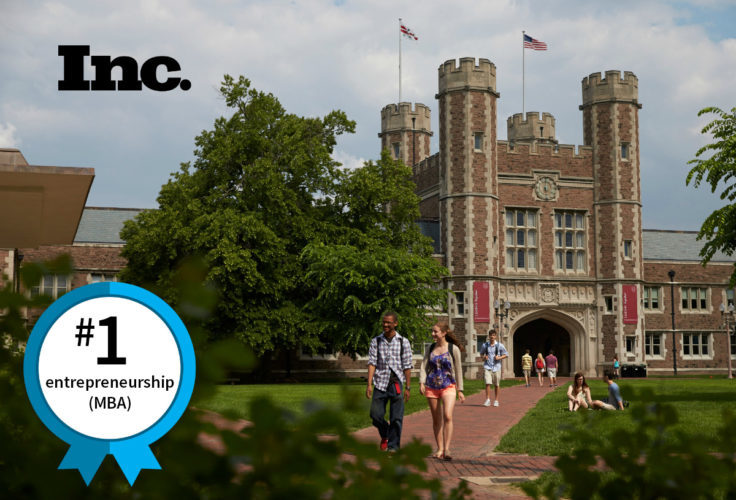The following is a repost from the Olin Business School blog, originally written by Kurt Greenbaum.
The Skandalaris Center is proud to support WashU student and alumni entrepreneurs.

WashU Olin Business School placed first globally for its MBA entrepreneurship program, according to a first-ever ranking of such programs from leading business magazine, Inc., released on Monday, October 28.
The magazine’s ranking, powered by Poets & Quants, evaluated a long list of statistics and program details—including metrics such as the percentage of recent graduates in startups or venture capital jobs, the number of entrepreneurship-oriented courses and funding raised at startups founded by recent MBA graduates.
After WashU Olin, Stanford, Babson College, the University of Michigan and ESADE rounded out the top five entrepreneurship programs in Inc.’s new ranking. Twenty-seven schools were included in this inaugural ranking, all but three US-based.
“It may come as little surprise that atop the list is the Olin Business School at Washington University in St. Louis,” the ranking’s authors wrote. “From 2016 to 2018, some 20.7% of Olin MBAs launched companies within three months of graduation — more than any other ranked school.”
Dean Mark P. Taylor lauded the results as good news for Olin students, prospective students and the alumni community.
“This ranking affirms the focus and priority we place on entrepreneurship at Olin,” Taylor said. “As always, our challenge is to maintain our momentum. Making entrepreneurship a key pillar of our strategic plan means we’re well-positioned to do so.”
Experiential focus
Olin’s 2018 strategic plan articulated four “pillars of excellence” defining the program we want to offer: entrepreneurial, values-based and data-driven, global and experiential.
“In eight months at Olin, I went from a loose idea to attracting paying customers and have now been running a profitable venture-backed company since graduation,” said Megan Berry, MArch ’15, MBA ’15, founder of By REVEAL, which creates customized pop-up boutiques for retailers looking to reach customers where they are.
The Inc. ranking comes on the heels of another analysis that offered good news for Olin: an independent review of Crunchbase business directory data showed WashU Olin had the world’s highest percentage of female startup founders among its alumni. Those Olin women secured the world’s highest average funding amounts for their startups.
“The entrepreneurial spirit runs deep here at Olin,” said Doug Villhard, professor of practice and academic director of the entrepreneurship platform. “All day long, we’re teaching people how to fall in love with problems—and how to do something about them. We have a unique ecosystem to support their work both on campus and in St. Louis.
Berry added: “I am tremendously grateful to Olin and cannot thank the faculty enough their passion in developing the next generation of leaders and generosity in time and connections that are instrumental to budding entrepreneurs.”
Affirming our work
The Inc. ranking was particularly gratifying for Villhard’s predecessor, Cliff Holekamp, who launched the entrepreneurship platform at Olin 12 years ago and retired in June to focus on his venture capital company.
“With Dean Taylor’s arrival and the new strategic plan we developed, we made the conscious decision to move entrepreneurship from a subspecialty to a key part of the program,” Holekamp said. “The key to maintaining our ranking is recognizing that entrepreneurship and innovation is an educational foundation for all Olin students, not only the entrepreneurship majors.”
Villhard added: “We also like to practice what we teach in thinking innovatively and entrepreneurially, and many of the key strategic initiatives at Olin—such as our new global immersion MBA program—may be viewed as entrepreneurial in spirit.”
Inc. used an analysis of data gathered by Poets & Quants for the new ranking, which was based on surveys of educators at eligible schools. The 33-question survey gauged metrics such as seed funding available for student-launched startups, the percentage of students who take at least one entrepreneurship course and the percentage of student-run clubs. The magazine also looked at the amount of related faculty research and a survey of entrepreneurship directors ranking their top programs.

